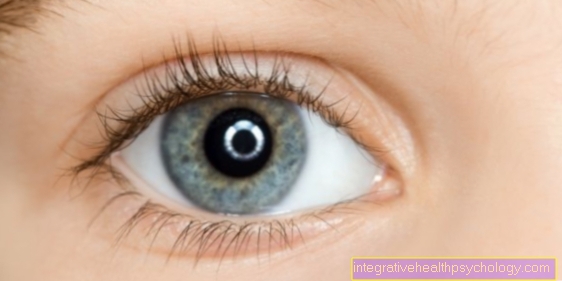psychotherapy
definition
Psychotherapy is defined as a method of treating mental illness and can be practiced by psychotherapists as well as by alternative practitioners. For this, special psychotherapeutic training is required, which you can complete as a psychologist or psychiatrist. Psychotherapy covers a very broad area and works with different techniques.

introduction
Psychotherapy is a form of therapy recognized by the health insurance company, which aims to cure mentally ill patients or to give them efficient opportunities to live with their illness. Psychotherapy can be practiced by psychotherapists as well as alternative practitioners. For this, special psychotherapeutic training is required, which you can complete as a psychologist or psychiatrist. Psychotherapy covers a very broad area and works with different techniques. However, psychotherapy became famous through Sigmund Freud and his form of psychotherapy, hypnosis.
For this reason, the form of therapy of hypnosis is often used in psychotherapeutic practices. Learn more about hypnosis below: Hypnotherapy
Some forms of psychotherapy therapy are, for example, analytical psychotherapy, psychotherapy based on depth psychology, and focal therapy. The main aim here is to understand what the cause of the patient's mental illness is and then, on the basis of this research into the cause, to gain self-knowledge on how to deal with the illness better after the patient is aware of what the trigger for the patient is Illness was. An example of this could be a patient sliding into depression. Because he wanted to be successful at work, he continued to neglect his social environment and activities. Once a patient has identified this cause of depression, they can change their lifestyle and focus more on the things that make them happier.
Read more about depression: Therapy for depression.
Another form of psychotherapy, on the other hand, is behavioral therapy. This is less about looking for the cause of the mental illness. It is about how the patient can deal with the existing symptoms and how he can change his behavior to such an extent that he can live well with the mental illness.
Psychotherapy also includes couple or family therapy, where couples can get advice, for example.
All in all, psychotherapy is a very broad subject, which also explains why special training is required in order to be able to use the various forms of therapy. Psychotherapy is usually paid for by the health insurances, as it is a recognized form of therapy for various psychiatric illnesses. Which form of psychotherapy is best suited for the patient depends not only on the patient's mental illness, but also on the patient's personality and willingness to provide therapy.
Psychotherapy costs
The cost of psychotherapy sessions will be in most cases covered by the health insuranceThis very much depends on whether the patient actually suffers from a psychiatrically recognized illness and what form of psychotherapy the patient would like to take advantage of. For example, couples therapies are often not covered by health insurance, while most other forms of psychotherapy are covered by statutory health insurance.
However, it is important to know that the costs for psychotherapy are only covered by the health insurance companies if the patient is due to a psychiatrically recognized illness is under treatment. The costs for psychotherapy are usually only paid up to a certain level, which means that the patient is allowed to have a certain number of psychotherapy sessions per quarter and these are also paid for by the health insurance.
The costs of psychotherapy are also not covered by the health insurance if a patient attends psychotherapy sessions with one unrecognized psychotherapists want to participate. In this case, the patient has to pay the cost of the psychotherapy sessions himself and is not entitled to any reimbursement from the health insurance company.
Psychotherapy for an anxiety disorder
With the help of psychotherapy, patients with various mental illnesses can be cured. In addition, through psychotherapy they learn to live with their illness and not to let it dominate them. Psychotherapy is particularly helpful for anxiety disorders. The main thing here is that the patient learns to control his fears and not to let them control him.
In general, there are different forms of psychotherapy to treat anxiety. A certain form of psychotherapy, so-called behavior therapy, is very successful. This form of psychotherapy tries to relieve fearful patients of their fear, so that the patients again have a higher quality of life and an unrestricted life. In several therapeutic sessions, the factors that increase fear are discussed in joint psychiatrist-patient conversations. The conversation should lead to a relief of the anxiety symptoms.
Then, with the help of psychotherapy, the fear-inducing behavior is revised and the patient thinks about strategies together with the therapist in order to be able to deal with the fear better. Then the patient can try out his learned behavior and face a fear-inducing situation (for example a conversation in front of many other people). Psychotherapy can therefore help anxious patients to overcome their fears. The patient becomes aware of his behavior and thought patterns and begins to revise them.
Nocturnal panic attacks can be very stressful for those affected. Find out all the important information about this at: Nocturnal panic attacks - what's behind them?
Psychotherapy for depression
Psychotherapy is a recognized form of therapy for the relief of various mental illnesses. Among other things, the Psychotherapy for depression. Since psychotherapy is very broad and includes behavioral therapy and psychotherapy, it is difficult to say which psychotherapy can best cure depression or which psychotherapy best helps with depression. This not only depends on the type of depression, but also on each patient.
For example, some patients speak very well to one Behavior therapy on. In this form of psychotherapy, depression is viewed as a specific behavioral pattern, the depressed patient being Is characterized by behaviors such as listlessness, sadness, and lack of emotion. In order to break this behavior, a precise analysis is carried out with the patient and the patient can thus learn which behavior is good for him and which behavior is more of a hindrance for him (for example, it can help a patient if he is actively involved in a club ).
Other patients, however, need another form of psychotherapy to relieve depression. For example, the PsychoanalysisAnother form of psychotherapy that can relieve depression, help patients understand where their depression is coming from and what exactly is causing it. Psychoanalysis is mainly concerned with analyzing how the patient fared in childhood and how it came about that certain behavioral patterns became more or less pronounced. For example, a patient who had a difficult childhood may develop depression later in order to work through it later.
Overall, there are many different aspects of psychotherapy that can relieve depression and help the patient lead a happier life again. Which form of psychotherapy is suitable for the patient varies greatly from person to person and should be discussed with the psychiatrist or psychologist.
Psychotherapy for burnout syndrome
Psychotherapy is good for burnout patients help to get out of their devil's spiral and active again to participate in life. Since psychotherapy is divided into many different sub-aspects, it is important that each patient decides individually with a psychotherapist which form of psychotherapy can most effectively treat burnout.
For example, there is a form of psychotherapy that can be very effective in treating burnout, as it aims to change the patient's behavior and thus prevent the patient from doing so keep from overloading yourself mentally again and again. This form of psychotherapy is called Behavior therapy. In this form of psychotherapy, burn-out is treated in that the patient should use a behavioral analysis to determine which behavior was particularly harmful for him and which led to him slipping into burn-out. Generally, behavior therapy aims to get the patient first to make people aware of what behavior was / is harmful to them. This allows the patient to develop new approaches independently or with the help of the psychotherapist to change his behavior so that he can live more health-consciously.
Psychotherapy for burnout is therefore a very effective method of helping the patient and thereby also healing the patient. Nevertheless, the patient must be aware that, despite psychotherapy, the burn-out does not go away within days, but that it can take weeks or even months until the burn-out is cured to such an extent that the patient no longer has any symptoms, despite professional psychotherapy.
Psychotherapy for post-traumatic stress disorder
Psychotherapy at PTSD (post-traumatic stress disorder) can be very helpful and help the patient in his difficult situation to participate more actively in life again. Since psychotherapy can be designed very differently for PTSD patients, it is important that each patient individually with his therapist decides which form of psychotherapy is best for him. For example, one form of psychotherapy for PTSD can be Behavior therapy be. The point here is that the patient learns, despite the stressful events in the past that triggered the post-traumatic stress disorder, to reflect and change his behavior to the extent that he is able to participate more actively and self-determinedly in life again.
Another form of psychotherapy for PTSD is this psychodynamic procedures. The main thing here is that the patient deals with the stressful events of the past and thereby better understands the backgrounds and causes of his own suffering and illness in order to then better cope with the mental illness and this himself to understand better.
Since every patient is very different, it is very important that every patient also has his own own adapted form of psychotherapy for PTSD worked out with his therapist. For some patients, for example, it does not help to research the exact cause of post-traumatic stress disorder, but rather it helps them more with the help of a therapist to work out ways to get out of the sad and stressful mood and actively change their own behavior.
Psychotherapy for obsessive-compulsive disorder

Psychotherapy can Obsessive-compulsive disorder treat successfully and help patients relieve their compulsions less often. A form of psychotherapy is particularly suitable here, which is also Behavior therapy is called. The main thing here is that the patient learns to better reflect his own behavior in order to then change it bit by bit and thus no longer have to surrender to his constraints.
For example, obsessive-compulsive disorder can be treated in psychotherapy by the patient learning that, for example, he can only check four times a day whether he has really turned off the stove. Or else the patient first learns his obsessive-compulsive disorder as such through psychotherapy perceive After several therapy sessions he can understand for himself when he really has to control or do something because it is important and when he controls or does something simply because he is feeling the compulsion, but not because it is absolutely necessary. Generally it is mostly difficult to cure obsessive-compulsive disorder completely and forever with psychotherapy. As with all mental illnesses, it is a long process and the patient may never be able to make his obsessive-compulsive disorder go away completely, but with the help of psychotherapy, the patient can get the OCD under control to such an extent that it no longer interferes with his everyday life.
Psychotherapy for an eating disorder
In order to be able to treat an eating disorder with psychotherapy, it is very important that the patient is explained and not persuaded by the parents or a partner to do so, as the chances of success are often significantly lower. Nevertheless, psychotherapy can achieve great success in eating disorders. Above all, it is important that patients learn to better reflect on their own body and behavior again, which is very possible with the help of behavior therapy, for example. Psychotherapy can also be helpful for eating disorders, as it also looks for the cause of the eating disorders.
For example, some patients suffer from eating disorders because they always had to perform at their best as children and are now just as disciplined in demanding that their body perform at its "best" and therefore become anorexic, for example. Other patients, on the other hand, eat their distress into themselves, which can also lead to some form of eating disorder. In general, psychotherapy for eating disorders can help to find and research the cause of the misdirected eating behavior.
Read more about this: Therapy for an eating disorder, vomiting due to stress
Psychotherapy in psycho-oncology
In general, psychotherapy is a form of therapy recognized by health insurance companies that can be very helpful for many different psychiatric illnesses. In psycho-oncology, psychotherapy can help patients manage their Cancer to understand better and, above all, to cope better with the disease. It also helps a person understand that cancer will change their life very much, and in some cases it will end it.
Psychotherapy in psycho-oncology is less aimed at analyzing what traumatic events could have happened to the patient in childhood, but more about helping the patient to live with his tumor disease and thus to get by, that the tumor is now part of their life and determines this significantly.
For example, the patient can use the Behavior therapy learn to face cancer fears. In general, psychotherapy in psycho-oncology should above all support the patient and should offer the patient various options so that he can not only understand his illness, but also know how to best live with the diagnosis of cancer, which is shocking for many patients.




























.jpg)
